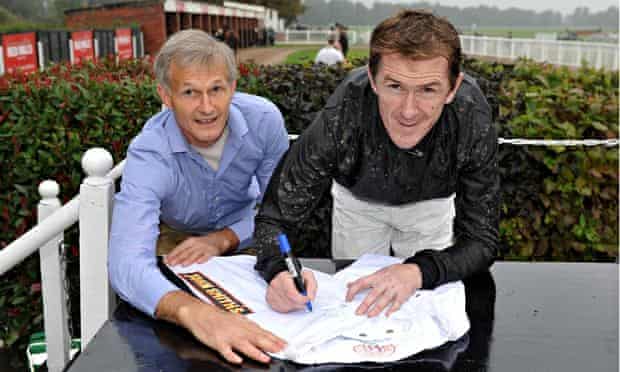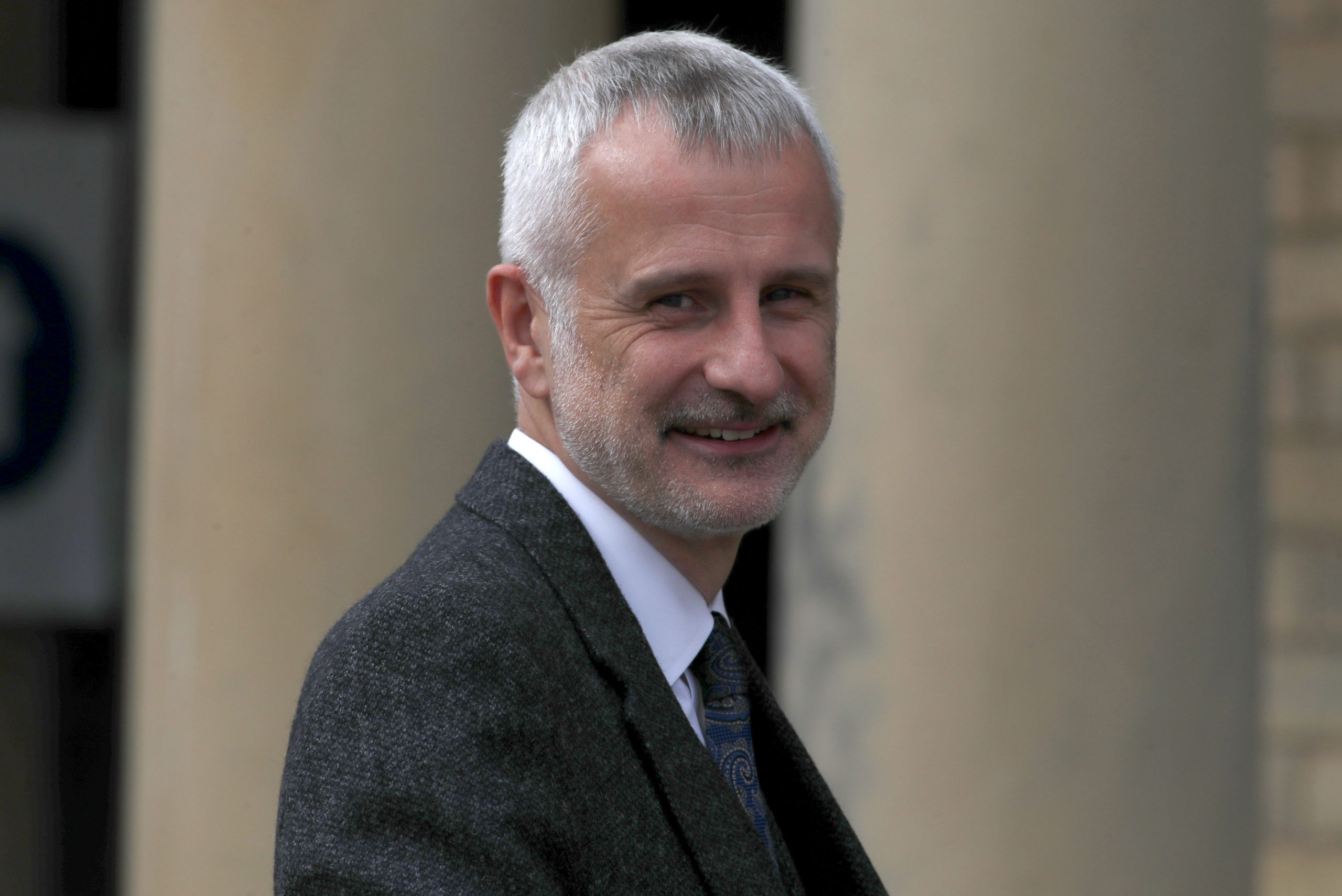“75% of jockeys are still depressed and why is that?”: Dr. Philip Pritchard on the constant struggle to improve jockey’s mental wellbeing

Where does one begin with Dr. Philip Pritchard? At his home and stables in the village of Purton, on the banks of the River Severn in Gloucestershire? At his GP’s surgery in Wotton-under-Edge? Or at the dozen or-so racecourse he acts as a racecourse doctor?
GP, physician, former Gloucester rugby player, ex racehorse trainer and jockey, Pritchard is a man of many talents. For those in British racing though, he is what his twitter handle says he is “thejockeysdoc”. The jockeys like him because he is one of their own and for those constantly on the move that don’t have their own GPs; Pritchard is their flying doctor.
“The only person the jockeys could turn to was me with their mental health, weight and sexual health problems. I was still working as a GP in the NHS at the time and the vast majority of National Hunt jockeys signed up with my practice because they knew they could phone me any time of the day or night and I would be able to help them.”
Pritchard’s pro-jockey, anti-bureaucracy approach did not sit well with the Jockey Club. Since entering the sport nearly 40 years ago, he has complained that theirs and the BHA’s sole interest is emergency treatment, so that they don’t have to pay out for negligence if a jockey is seriously injured. As Pritchard adds:
“Michael Turner (Former BHA Chief Medical Adviser) did an excellent job in providing a safe environment for the jockeys but it wasn’t helping those jockeys in the problems they were experiencing as far as their anxieties, depression and weight management.
“I kept on telling Turner, you need two or three doctors on the racecourse. There are emergency doctors saving the life of a jockey when he’s broken but I kept saying we need a sports physician on the racecourse to give jockeys education in terms of their weight management, fitness and mental wellbeing, but the BHA remit didn’t fall under that.”

Groundbreaking study at Liverpool John Moore’s University
When Pritchard first entered the horseracing industry in the early 80s from the amateur sport of rugby union, he was appalled at the lack of care given to jockeys. During his time at Gloucester Rugby, there was a support staff and network of people looking after the players; which was in stark contrast to a jockey’s changing room, where the only individual there to support the jockeys was the valet.
Since then, Pritchard has been constantly looking to improve the overall wellbeing of jockeys but he never had the scientific proof to back up his claims with the BHA. This changed after a conference he attended in Abu Dhabi where he spoke of a team of doctor’s he was linked with at Liverpool John Moore’s University who were eager to compile a study on jockey’s weight management.
“The only problem was they didn’t have any finance. Fortunately, though, the Arab’s wanting to impress the racing world agreed to finance the project. I managed to get £240,000 to fund the venture over a couple of years and turn out some papers.”
The project entailed taking 20 jockeys, including a couple of former Champion flat jockeys who had/have weight problems and measure all their parameters. During a six-week period, the subjects were fed at regular intervals and assessed at the end of the six weeks.
One of the members of the John Moore’s team was a psychologist named Dr. Costas Papageorgiou who devised some general questions and protocols to assess the jockeys mental wellbeing.
“It turned out when we assessed the jockeys before feeding them that 75% of the jockeys were depressed and 10% were suicidal. 15 were registered as clinically depressed and two of them as suicidal.
“We then fed them for six weeks and at the end of that period, we found that the they had lost five pounds on average, which is huge for a jockey. But more importantly their mental wellbeing had improved just from being able to eat regularly.” Pritchard added,
“The basic theory was if you feed the body, you increase the basic metabolic rate your body works at and by increasing that, you burn up more calories.
“We took these findings to the BHA and said ‘look how ill these jockeys are.’ Dr. Hill latched onto it and fortunately now, we have really helped finance a much better program for looking after jockeys.”
This was the crucial breakthrough Pritchard was craving to prove that jockeys had not been looked after for the last half century.
Jockeys are “unfit, fat and fragile”
Professional jockeys are unique in athletic communities in that they have a daily requirement to make weight. Historically, methods of weight making have included chronic dehydration, starvation and forced vomiting which are detrimental to jockeys both physically and mentally.
The findings from LJMU’s study led Pritchard to coin the term jockeys are ‘unfit, fat and fragile.’
“They were unfit compared to other sportsmen. They were fat because when we measured their body fat it was 15% – no athlete should have that especially one trying to do a low weight. Fragile in that they are mentally shot.
“A lot of the jockeys didn’t like what I was saying but it was true.”
Whereas most other sportsmen have their destiny in their own hands, jockeys don’t. No matter how fast or fit a jockey is, you will only get the results if you’re on the right horse. For the majority of younger jockeys there is also the dilemma:
“Do you get off this horse and tell the trainer the horse is not good enough knowing you may never get the ride again. Or can you come up with a satisfactory explanation.
“Established jockeys can say the horse wasn’t fit or needs to be ridden differently next time out but the younger jockey has to appease both the owner and the trainer. It’s a really mentally shattering position for an athlete to be in.”
The vast majority of self-employed sportsmen have a team assembled around them including a driver, agent, physician and fitness instructors. The only person a jockey employs is an agent whose only job is to get them on the next winner; they are not qualified to deal with weight and mental health issues. As Pritchard says:
“It is not a clever sport at this moment in time and although there are a lot of people making noises trying to improve it and the PJA have a service in place to deal with jockeys who are so-called depressed…I’m not sure it is being used right.”

“We were unable to stop what happened. In the end he made his own decision”
Friends and fellow jockeys said that James Banks always made you laugh and was extremely popular in the the weighing room. Yet he took his own life on February 2nd last year after losing his home and going bankrupt.
Former jockey Liam Treadwell was a pallbearer at his funeral. Treadwell had won the Grand National 11 years earlier aboard Mon Mome for Venetia Williams but a series of falls including one major incident at Bangor-on-Dee racecourse in 2016 caused cumulative concussions.
He openly spoke about his mental health issues and many thought he had turned a corner when he returned to racing with trainer Alastair Ralph in March 2019.
On June 23rd 2020, mourners lined the street after his death at the age of 34. John Ellery, the senior coroner over the investigation into his death said ‘Treadwell did not mean to kill himself but he had considered the risk’ and “beneath Liam’s public success was a history of anxiety and depression.”
Something which Treadwell’s physician, Dr. Pritchard can attest to:
“You can ride the winner of the Grand National but it’s still not going to alter your way of thinking. It’s a temporary release that you need again and again.
“I had all the jockeys over two weeks after Liam’s death because everyone was saying ‘we didn’t do this and didn’t do that’. But I told them that Liam had his demons and he fought those demons.”
Pritchard added,
“I tried to work on him, tried to improve him and help him. He had everything there to help but we were still unable to stop what happened. In the end he made his own choice.
“Yes, we must try and learn from it but we must not beat ourselves up about it because I had organised multiple appointments for Liam and had him on really serious medication at various times. There was support mechanisms in place for him but you can only do so much.”
A wider question now faces horse racing as a whole: does the sport have a mental health problem? And if it does what can be done about it?
The jockey’s champion Pritchard is in no doubt,
“75% of our jockeys are still depressed and why is that? That’s the biggest worry for me.”

What can be done?
In a sport where riders are followed by an ambulance during every race, it is easy to see why jockeys are perceived to be ironmen. They are still human though and are not immune to mental health issues.
There are scores of people who have been helped through various initiatives, including those of the Professional Jockeys Association and Racing Welfare, which both run 24-hour helplines. While phonelines help some, they may not work for others.
As current jockey David Bass pointed out, some jockeys may need CBT therapy to deal with the constant pressures of life in the saddle.
An unintended but positive outcome of the post-lockdown world of racing has been limiting jockeys to competing at one fixture a day, rather than afternoons and evenings. For Dr. Pritchard, altering the schedule is the first port of call when dealing with mental health issues,
“Every jockey should have a mandatory three days off every two weeks. They can take those three days whenever they want. If they all have to do that it makes the jockeys championship fair and they will all lose out in effect the same amount.”
In July 2014, Dr. Jerry Hill was appointed to the role of BHA Chief Medical Adviser, replacing Michael Turner. With experience as a Senior Racecourse Medical Officer, a member of the Football Association medical committee and Sports Physician at the 2012 London Olympic Games, Pritchard believes Dr. Hill is much more in tune with providing jockeys what is most needed.
“With me in his hear telling him what’s gone on in the past, things are getting better. He has finally helped to break the mould by getting jockeys to understand that they are athletes because jockeys had always lived by tradition…they hadn’t opened their eyes to sports medicine.”
Traditions of hiding injuries, wasting, drinking alcohol the night before a race to dehydrate yourself and saunas are hopefully becoming a thing of the past.
Racing must now look ahead, while remembering those it has lost.
Dr. Pritchard won’t rest on this subject and neither will I. We must keep asking, keep inquiring and keep listening to understand what these young men and women are going through on a regular basis.
Confidential support and helplines are available 24-hours a day for those in the racing industry via the PJA (07780 008877) and Racing Welfare (0800 6300 443)